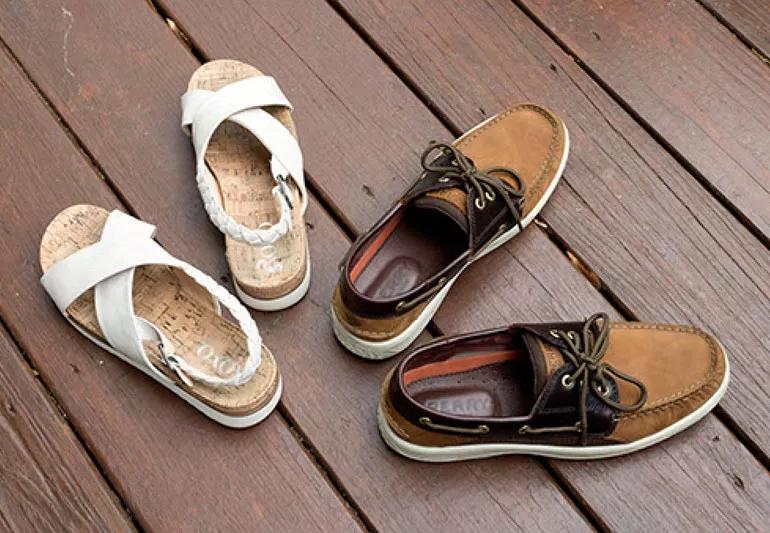Keep stepping through summer with this good-for-your-feet footwear guide

Image content: This image is available to view online.
View image online (https://assets.clevelandclinic.org/transform/d073c74a-ef57-42be-bebe-8dad8aa115cb/bestSummerShoes-DG-060520-770x533-1_jpg)
best summer shoes
Flip flops, heels, wedges, tennis shoes, flats – summer shoe choices are endless. When it comes to summertime foot fashion may be fun, but unfortunately not always functional for your feet, legs, spine or posture. Still, podiatrist Joy Rowland, DPM, suggests that shoes aren’t the only culprit of poor foot health.
Advertisement
Cleveland Clinic is a non-profit academic medical center. Advertising on our site helps support our mission. We do not endorse non-Cleveland Clinic products or services. Policy
“Many foot problems are inherited,” she says.“In fact, your genes are more important than the shoes you wear when it comes to foot health. But you can definitely avoid some pitfalls and add some comfort by choosing your shoes wisely and switching them up occasionally.”
You can’t change your genes but you can change your shoes. So what’s the perfect pair if you want to keep your feet happy and healthy all summer long? Here’s your guide to summer footwear with advice from Dr. Rowland.
“Unfortunately, the perfect pair doesn’t exist,” Dr. Rowland says.“The perfect shoe for you is not the perfect shoe for me. We all have a different foot type, body shape, posture and movement habits, so you’ll have to do a little trial and error to find what gives your feet the most support and comfort.”
Even if some summer styles aren’t the best for foot health, you can minimize the impact they have on your foot by wearing them occasionally, or only for short periods of time. Wearing them for shorter periods of time helps reduce the impact on your body.
Flip flops are best worn for short periods of time because they can aggravate foot problems. They’re OK for a walk to the mailbox or the beach, but never wear them daily. Choose flip flops with some padding or thick bottoms to cushion the ball of your foot. Also look for flip flops that have arch support.
Advertisement
While flats go with everything, they’re not the best option for long-term wear with lots of walking like a day of shopping or sightseeing.
“The arch tends to fall, which causes the legs to rotate inward,” Dr. Rowland says. “Once that knee starts to go, then your hips go, so it changes your posture.”
If you wear flats, choose a pair with arch support and cushioning on the bottom or room for an insole.
Slipping on a pair of heels every day can be problematic, especially if they’re high. Heels shift your body weight forward and can lead to lower back pain as your spine and hip muscles adjust. The extra pressure on your knees can lead to arthritis.
“If you do have to wear a higher heel it’s best to mix up your heel heights,” Dr. Rowland says.
Wearing the same heel height all the time can cause the back of your leg and Achilles tendon can get tight. Try wedge heels, which can also provide better support.
“Reserve wearing high heels for special occasions,” Dr. Rowland also says. “Pointy-toe heels, especially, are harsh on your feet.”
Overall, the best shoe to wear daily is a good-quality sneaker. Walking, running or cross training shoes tend to lace up or fasten up to support your whole foot. And due to the nature of their job they tend to be made from materials that are more breathable and moisture resistant.
Be careful of trendy athletic shoes that are more about design than what’s on the insole. Some athletic shoes are made from lower quality, less breathable material and can cause other foot problems like odor or sweating — especially in warmer summer temperatures.
“Proper fit is important across all shoe styles.” Dr. Rowland suggests. “The better a shoe fits your feet, the less work the rest of your body must do to make up for it.”
A good-fitting shoe relieves foot pain and prevents future problems for your feet. Taking these steps to choose them wisely can help you out your best foot forward into summer!
Advertisement

Sign up for our Health Essentials emails for expert guidance on nutrition, fitness, sleep, skin care and more.
Learn more about our editorial process.
Advertisement
A few precautions can keep your toenails from turning black and falling off
Sweat plus bacteria equals sour-smelling feet
If they don’t fit well in the store, they won’t fit any better at home
The lack of arch support in the popular footwear can lead to numerous aches and pains
Keep your tootsies soft and smooth all summer long
How to slough off that dead skin for softer, smoother feet
Give your nails a chance to breathe, stay healthy
Make sure your salon is clean and sterilizes its instruments
Type 2 diabetes isn’t inevitable with these dietary changes
Applying a hot or cold compress can help with pain
Pump up your iron intake with foods like tuna, tofu and turkey